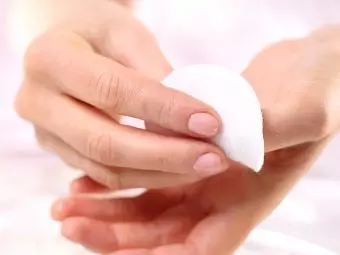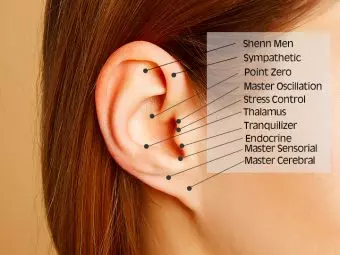Our hectic lives often force us to stock up on foods in the refrigerator. While this may save time, how safe is it to freeze food in plastic containers? Plastic is becoming a go-to material for multiple purposes. Its versatility is making it a part of our daily lives. However, there are many queries around the use of plastic for packaging or storing food. Keep reading to understand if plastic is safe for food storage and any safer options of plastic that you may consider.
In This Article
Types Of Plastics
Generally, plastic food containers are made of different kinds of plastics. Usually, the triangle mark contains a ‘resin identification number’ inside it. This number actually denotes the degree of recyclability of the plastic, and the triangle determines if the plastic is recyclable or not.
Safe Plastics
Some plastics are preferred to others when it comes to storage and packaging of food. Generally, safe plastics include materials like:
1. Polyethylene Terephthalate (PET Or PETE):
This is the most popular form of plastic container in the market. Used to store all kinds of foods and beverages like water, juice, mayonnaise etc., PET jars can be reused once they are cleaned with soap water. However, a word of caution: research shows that washing PET bottles over and over again can result in the plastic’s toxic and carcinogenic chemicals getting into stored food or water. Discard your PET jar if it gets cracked or appears cloudy.
2. High-Density Polyethylene (HDPE):
Another safe plastic used to make milk jugs and water bottles, high-density polyethylene does not release toxic or carcinogenic chemicals into food or water and is accepted by most recycling companies.
3. Low-Density Polyethylene (LDPE):
These types of plastics don’t release chemicals into stored food, but they aren’t readily accepted by recyclers. LDPE plastics are usually used to make sealable sandwich bags, plastic cling-wrap, and squeezable condiment bottles.
4. Polypropylene (PP):
This type of plastic container does not release any chemicals into food or water, but not all organizations recycle polypropylene. It is primarily used to make yogurt and other reusable snack containers.
5. Bio-Plastic:
This plastic is usually used to make plastic cups, picnic plates and utensils. It is created using renewable sources like corn, potatoes, sugarcane and other starchy foods.
Unsafe Plastics
These plastics are quite dangerous and can cause chronic diseases. Unsafe plastics include:
1. Polyvinyl Chloride (PVC):
This type of plastic is regularly used to make cling-wraps and other plastic containers. PVC releases dioxins that are classified as human carcinogens. PVC also contains phthalates that can lead to improper hormonal function, and can even cause hormonal damage.
2. Polystyrene (PS):
This plastic is used to make cups, cartons and take-out containers. The popular white foam cup is made up of polystyrene, whose manufacture releases carcinogenic and toxic chemicals that can lead to many health conditions.
3. Polycarbonate (PC):
Usually used to make water cooler bottles and baby bottles, polycarbonate contains bisphenol A, which has known hormone-disrupting qualities.
Freezing Food
Usually, the best plastic container to store frozen food is a moisture-vapor-resistant plastic container with a lid. These plastics are quite safe and can be used for years. On the other hand, you can consider using Pyrex glass containers with lids to freeze, microwave and store food. These are available quite easily and pose no threats, unlike toxic and carcinogenic chemicals that are used to make plastic (1).
Is It Safe To Freeze Food In Plastic Containers?
You have looked at the different safe and unsafe plastics, and what kinds of plastics you can effectively use to freeze food. Plastic has many domestic and industrial uses, but it is not a good material to cook, reheat, freeze and store food in, even if the plastic is marked microwave safe or temperature resistant. So the next time you are about to freeze some food, consider wrapping it in an aluminum foil instead of a cling–wrap.
And please tell us about your methods of storing food. Leave a comment below!
Freezing food in plastic has become very common nowadays because of hectic work schedules, which generally demand stocking up of food. However, many are worried about plastic usage for food freezing or storing. Plastics are divided into safe plastics and unsafe plastics. Safe plastics are generally preferred over unsafe ones for food packaging. However, compared to other materials like glass, the plastic weighs more on the unsafe side even after labeling safe. Hence, minimize food freezing in plastic and consider wrapping it in an aluminum foil or freezing it in a glass container with a lid.
Frequently Asked Questions
What is the best container to freeze food in?
Freezer-safe glass containers are the best option for freezing food in, as there is no risk of chemical leach. However, certain plastic containers also work just as well.
Are Rubbermaid plastic containers freezer safe?
Yes, Rubbermaid plastic containers are designed from BPA-free plastic and crafted to be freezer-safe.
Related
The following two tabs change content below.
- Author

Jyotsana Rao
Jyotsana Rao is an engineering graduate from NIT, Nagpur, who discovered her love for writing during her undergraduate days. She… more



 How To Take Care Of A New Tattoo And Safety Precautions
How To Take Care Of A New Tattoo And Safety Precautions I Slept With An Onion In My Sock And This Is What Happened
I Slept With An Onion In My Sock And This Is What Happened 6 Brilliant DIY Ideas For Nail Polish Removers
6 Brilliant DIY Ideas For Nail Polish Removers Acupressure Points On Ears: What Are They And Do They Work?
Acupressure Points On Ears: What Are They And Do They Work? 8 Best Ways To Increase Oxygen Levels In Blood
8 Best Ways To Increase Oxygen Levels In Blood 20 Most Beautiful Flowers That Are Commonly Available In India
20 Most Beautiful Flowers That Are Commonly Available In India Top 5 Online Beauty Products Sites For Shopping In India
Top 5 Online Beauty Products Sites For Shopping In India Top 19 Bindi Designs For You To Try
Top 19 Bindi Designs For You To Try 11 Things You Should Never Put On Your Face
11 Things You Should Never Put On Your Face